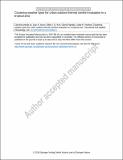Clustering weather types for urban outdoor thermal comfort evaluation in a tropical area
Author(s)
Acero, Juan A.; Koh, Elliot J. K.; Pignatta, Gloria; Norford, Leslie Keith
Download704_2019_2992_ReferencePDF.pdf (1.926Mb)
Open Access Policy
Open Access Policy
Creative Commons Attribution-Noncommercial-Share Alike
Terms of use
Metadata
Show full item recordAbstract
Outdoor thermal comfort is a major concern in urban areas throughout the world. Sophisticated modeling techniques have been developed to analyze the interaction of the urban areas with the regional climate. However, in most cases, the assessment of outdoor thermal comfort is not based on a long-term analysis and provides results only for specific meteorological conditions. In this study, we apply a clustering method to yearly weather files with the aim of obtaining representative boundary conditions for urban microclimatic models. The results describe typical-day weather situations commonly known as weather types. The study is carried out in the hot and humid tropical conditions of Singapore, where ten weather types are defined. The analysis of the clusters’ performance shows adequate results. ENVI-met (v.4.3) model is used to evaluate the impact of weather types on thermal comfort in a courtyard surrounded by high-rise buildings. Results not only show different levels of thermal comfort but also different spatial distribution and diurnal evolution inside the courtyard for each weather type. We conclude that it is relevant to analyze thermal comfort in all predominant weather conditions so as to have an accurate and complete assessment of the existing thermal situation. The approach presented in this study will provide better support to planners and decision makers in the development of urban spaces in regard to their expected use.
Date issued
2019-09Department
Massachusetts Institute of Technology. Department of ArchitectureJournal
Theoretical and Applied Climatology
Publisher
Springer Science and Business Media LLC
Citation
Acero, Juan A. et al. "Clustering weather types for urban outdoor thermal comfort evaluation in a tropical area." Theoretical and Applied Climatology 139, 1-2 (September 2019): 659–675. © 2019 Springer-Verlag
Version: Author's final manuscript
ISSN
0177-798X
1434-4483